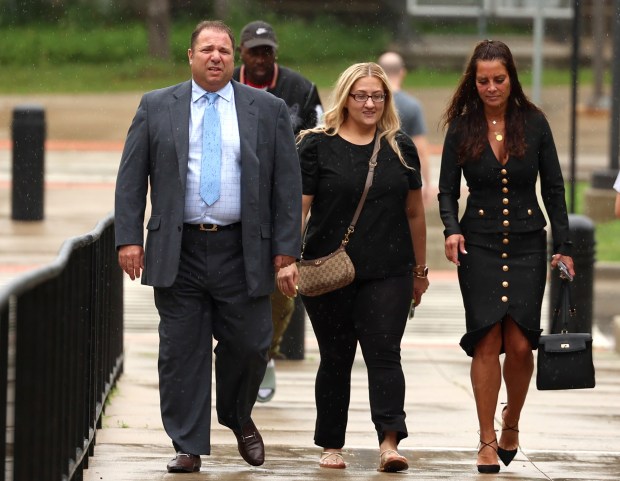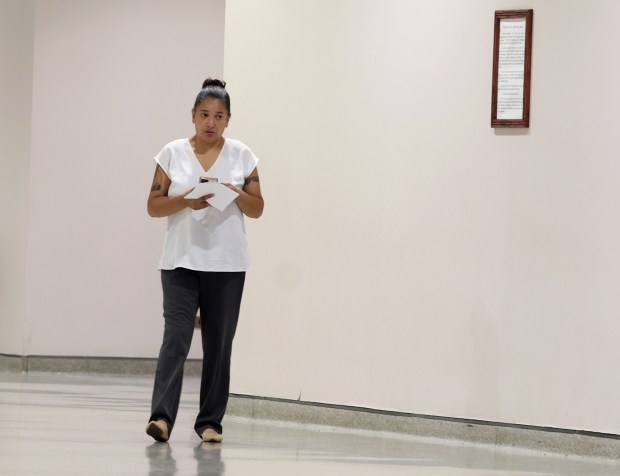After investigating complaints that Crystal Lake endocrinologist Dr. Hiralal Maheshwari had touched patients inappropriately in his exam rooms, McHenry County prosecutors approved a felony charge of criminal sexual abuse in December 2021.
Under state law, the prosecutors should have immediately notified the Illinois Department of Financial and Professional Regulation, the state agency with oversight over medical professionals. The department — which also had been investigating Maheshwari — then should have issued an order within five days requiring a medical chaperone at his appointments while the criminal case played out.
That did not occur. Instead, nearly five months passed before the state issued the chaperone order, allowing Maheshwari to continue to see patients unsupervised.
This wasn’t the only time criminally charged health care workers were left free to engage with patients without required oversight. Although a decade-old state law mandates quick action when a licensed doctor, nurse or other health professional is charged with a sex offense or a violent felony, or with misdemeanor battery against a patient, a Tribune investigation found it often took weeks or months for state regulators to require a chaperone or take more drastic action.
Of 35 health care workers who were charged with eligible offenses since Jan. 1, 2019, the Tribune found roughly half remained in good standing with the licensing agency for more than a month after criminal charges were brought in court. The Illinois Department of Financial and Professional Regulation, or IDFPR, did not take any action against the licenses of at least eight health care workers for more than six months after they faced qualifying charges.
In instances where health care workers were detained before trial or were swiftly terminated by their employers, a delay in the issuance of a chaperone order may have mattered little. But in other cases, the workers were able to continue in their jobs or obtain new ones and care for patients unsupervised despite the criminal charges.
The findings follow a Tribune investigation into patient sexual abuse earlier this year that revealed the IDFPR was at times slow in disciplining licensed health care workers accused of abusing patients, including when IDFPR was aware of allegations but criminal charges had not yet been filed. In some instances, additional patients said they were harmed before the state agency took action.
The agency, in explaining some of those delays, told the Tribune earlier this year that local prosecutors often failed to notify them of criminal charges of sexual assault involving medical providers.
To look into that assertion, the Tribune sent public records requests to nearly 40 police departments and state’s attorney’s offices and to the IDFPR requesting information about the 35 criminal cases, disciplinary actions by the state and any communications between prosecutors, police and the IDFPR. The Tribune also reviewed criminal court dockets and other court records and sought comment from 10 state’s attorney’s offices that charged health care workers with crimes but state action against the workers’ licenses did not quickly occur.
Presented with findings showing repeated delays when health care workers faced criminal charges, the state agency again placed the blame on local criminal justice authorities who failed to properly notify the department of charges, including failing to provide the agency with required documents.
Those failures “can delay action by IDFPR because we cannot curtail a licensee’s rights until we establish a legally sufficient basis to do so,” department spokesperson Chris Slaby said in a written statement.
Representatives from some state’s attorney’s offices told the Tribune it was their policy to promptly notify IDFPR if health care workers are charged, though in some cases they did not share specifics about how or when the notification was provided. Prosecutors also said it is not always possible to determine if a criminal defendant is a licensed health care worker. And a spokesperson from one office, in Will County, said the office was not aware of the law’s requirement.
In the case of Maheshwari, former McHenry State’s Attorney Patrick Kenneally did not answer Tribune questions about whom his office had contacted at the IDFPR, when the notification was made and how it was communicated.
“IDFPR opened a parallel investigation and there was a fair amount of information exchange between police, us, and IDFPR leading up to and after charges,” Kenneally said in a written statement. “So if they are saying they were not aware, that would not be accurate.”
The licensing agency did file a complaint against the doctor in February 2022, but the complaint made no mention of the criminal charges filed in December and placed no immediate restrictions on the doctor’s license. A chaperone order was not issued until May 2022.
Slaby did not answer specific questions about individual cases but said that, regardless of other communications, prosecutors are required by law to provide a copy of the criminal charges. “When that procedure is not followed, typically additional steps must be taken before the chaperone order can (be issued), which can cause delay,” he said.
Maheshwari did not respond to requests for comment for this story. Court records show that he continued to practice, with the chaperone requirement in place, even after he pleaded guilty to reduced criminal battery charges related to his conduct with two patients. His medical license was revoked in late November 2023 — nearly two years after he was first charged.
The Cook County state’s attorney’s office handled the largest number of the 35 eligible criminal cases involving health care workers since early 2019, with 11 workers eventually facing IDFPR discipline. In four instances, it took more than a month for a chaperone order or more serious action to be imposed on the worker’s license. Two of those cases, both pending in court, involved interactions with patients.
In one, Arlington Heights plastic surgeon John Kotis was charged with disorderly conduct and battery of a patient at a private residence. A chaperone order was issued three months later.

In a motion to dismiss the charges, Kotis described consensual sexual contact with the patient. A judge denied the motion, and Kotis’ next court date is Dec. 12. Kotis did not respond to requests for comment.
The other pending case involves a sexual exploitation charge against home care nurse Kimberly Ramirez, who was caring for a 9-year-old patient with diabilities in the child’s Orland Park home. Roughly three months after a warrant for her arrest on the felony charge was first filed in court, the home care nurse was placed under a chaperone order. An attorney for Ramirez declined to comment. The judge in Ramirez’s case prohibited her from engaging in nursing activities without explicit permission following her February 2024 arrest.

In a statement, the Cook County state’s attorney’s office said it could not comment on pending cases, but said the office is “committed to reviewing our internal protocols to make certain we’re following a comprehensive process that ensures the CCSAO meets its obligation to the state.” The office also said that in some instances, when a person’s profession is not included in initial case facts or is not relevant to the charges, the office may not immediately know of the need to notify the state.
Former Illinois Sen. Kirk Dillard, R-Hinsdale, championed the notification law as a state senator in 2011 following a Tribune series that exposed a flawed state disciplinary process that allowed doctors convicted of sex offenses to keep practicing.
“Chaperones should immediately be assigned anytime there’s a charge,” Dillard said, adding: “It’s clear from the new Tribune series that state’s attorneys must be extraordinarily vigilant and question whether any sexual predator might be a health care worker.”
The Tribune found in Cook County and elsewhere that hasn’t always happened.
For example, Winnebago state’s attorney’s office spokesperson Katie Zimmerman said the office was not aware Lamarr Wooden was a registered nurse until after his trial. He was sentenced in November 2023 to eight years in the Illinois Department of Corrections for criminal sexual assault and abuse.
The charges against Wooden were unrelated to his profession, but records from the Roscoe Police Department indicate police took Wooden into custody at his place of employment, a plastic surgery center. His nursing license remained in good standing for three years after he was charged, though he was in custody for some of that time. The state revoked it this March.
Zimmerman said in August that the office was “in the process of making the appropriate notification” to IDFPR. Asked for an update in December, the office provided no additional details.
Wooden said in an email from prison that he continued working as a nurse while his charges were pending and he did not know about the law requiring that he work with a chaperone.
Kenneally, the former McHenry County state’s attorney, said it is the office’s practice to notify IDFPR when they charge a health care worker with eligible offenses, but it’s “tricky” when the person is charged in incidents that don’t occur with patients or while at work. Police reports might not include or might have “merely referenced” a defendant’s employment, or it might not be clear from the name of the defendant’s employer that the person is a health care worker, he said.
In the two criminal cases the Tribune identified involving health care workers’ off-duty behavior in McHenry County, police records briefly mention both individuals were health care professionals.
In one case, 48 days elapsed from the time a clinical professional counselor involved in a bar fight was charged with aggravated battery and when a chaperone order was issued. In the other, an advanced practice nurse’s license remained without restrictions for roughly 113 days after he was arraigned on charges including aggravated domestic battery. That incident included allegations the nurse broke a glass jar on his wife’s head and lit her hair on fire.
In at least one county, the state’s attorney’s office was unaware of the law’s reporting requirements.
In Will County, a registered nurse was charged in 2019 with possession of child pornography, a felony sex crime, yet obtained employment at three different nursing homes or rehabilitation facilities during the roughly 18 months between his indictment and the state’s order to work with a chaperone. He ultimately pleaded guilty to the felony charge, and his license was revoked.
Will County Assistant State’s Attorney Peter Wilkes said the nurse’s charges were not immediately reported to the IDFPR because his office “was absolutely not aware of this requirement.”
“There wasn’t a notification because our office didn’t know; that is something I think is clear,” Wilkes said.
For its part, IDFPR is taking “proactive measures” to improve collaboration with police and prosecutors, according to Slaby. The agency launched a new email inbox in February for criminal justice authorities to use when reporting crimes and earlier this year sent police departments and state’s attorney’s offices information about the requirement to report charges to IDFPR. Slaby said the office has also met with several agencies to share information so the offices can “work together to ensure bad actors do not pose a risk to Illinois consumers.”
The IDFPR has also begun assigning agency prosecutors to cases earlier when the complaints may be eligible for a chaperone order, according to Slaby’s statement.
Dillard, the bill’s original sponsor, called on the state to do more.
“As the sponsor of the law I expected the department and the state to, through rulemaking, tighten up the statute to make it work using their professional knowledge of the system,” Dillard said. “(The state) needs to get off the dime after a decade and do what it was instructed to do.”





